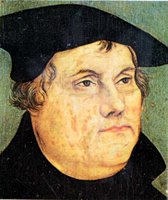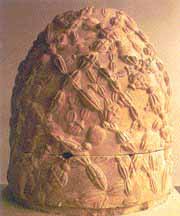Comparing the reactionary movements of Neo-Confucianism and Protestantism Compare the Protestantism and Neo-Confucianism. Why and how did they differ from their doctrines of origin, Roman Catholicism and Confucianism? What influenced the reforms that resulted in these religions, and how were the changes in their original doctrines similar or different?
 History's halls rang with the sound of a single hammer as one man remodeled Christianity for all time. This man was Martin Luther, and he changed history's course when he nailed his 95 Theses to the door of the cathedral in Wittenberg, Germany on October 31, 1517. These theses challenged the Roman Catholic Church by inviting debate over the legitimacy of many of the Church's practices, especially the sale of indulgences. Luther's simple action not only got him into trouble with church authorities but also precipitated the reform of Roman Catholicism in Europe. Protestantism resulted from this reform, called the Protestant Reformation because its reformers protested against the corruption and unbiblical practices in the Roman Catholic Church. Though this was arguably the most important religion in European history and perhaps the world, it is only one among the thousands of other religions on earth. Another such religion was Neo-Confucianism in China. Though many differences exist between these two religions, their origins, and the reforms that created them, one can also find a number of similarities between them as well.
History's halls rang with the sound of a single hammer as one man remodeled Christianity for all time. This man was Martin Luther, and he changed history's course when he nailed his 95 Theses to the door of the cathedral in Wittenberg, Germany on October 31, 1517. These theses challenged the Roman Catholic Church by inviting debate over the legitimacy of many of the Church's practices, especially the sale of indulgences. Luther's simple action not only got him into trouble with church authorities but also precipitated the reform of Roman Catholicism in Europe. Protestantism resulted from this reform, called the Protestant Reformation because its reformers protested against the corruption and unbiblical practices in the Roman Catholic Church. Though this was arguably the most important religion in European history and perhaps the world, it is only one among the thousands of other religions on earth. Another such religion was Neo-Confucianism in China. Though many differences exist between these two religions, their origins, and the reforms that created them, one can also find a number of similarities between them as well.One difference between Neo-Confucianism and Protestantism lies in their origins. Protestantism originated from a denomination of Christianity, Roman Catholicism, basically the only denomination in Europe in the sixteenth century. Christianity centers around the worship of a single, triune God and the study and guidance of the Bible, the inspired word of God. Christians believe that God loved all men so much that he sent Jesus Christ, his own son, down to earth in the flesh, to live for a short time among man, and then to die to pay for the sins of all men. By the sixteenth century, however, Roman Catholicism had added many doctrines to Christianity that was not found in the Bible. Such additions included salvation by faith plus works, transubstantiation, the worship of Mary, the mother of Jesus, the infallibility of the Pope, and Purgatory to mention a few. On top of that, many of the Church authorities were corrupt, demanding high taxes, owning altogether about one-third of all the land in Europe, selling church offices, and even selling indulgences or "forgiveness" for sins. All this combined to make many Europeans discontented with the Roman Catholic Church.
 Neo-Confucianism, on the other hand, originated from Confucianism, which was not truly a religion. Original Confucianism was actually a philosophy or code of ethics based on the teachings of Confucius, a traveling scholar. According to Confucius, an individual's ultimate goal should be to live according to té or virtue, particularly the virtues of li, propriety and ritual, and jén, "benevolence, charity, humanity, love, and kindness." Jén found expression in the "silver rule" of Confucianism—"Do not do unto others as you would not have them do unto you." This saying by Confucius is the exact contrapositive of the command given by Jesus Christ to his followers. Confucianism set forth five pairs of relationships to observe: the emperor and subject, the father and son, the husband and wife, the elder and younger brother, and the elder and younger friend. In these relationships, "the superior member (parents, husband, etc.) has the duty of benevolence and care for the subordinate member (children, wife, etc.) The subordinate member has the duty of obedience." These relationships created the concept of xiào, or filial piety, that Confucius considered very important. In comparison, both Roman Catholicism and Protestantism stressed the importance of these same relationships, though they did not did not stress all of the relationships set forth by Confucianism and more often stressed the concepts behind such relationships.
Neo-Confucianism, on the other hand, originated from Confucianism, which was not truly a religion. Original Confucianism was actually a philosophy or code of ethics based on the teachings of Confucius, a traveling scholar. According to Confucius, an individual's ultimate goal should be to live according to té or virtue, particularly the virtues of li, propriety and ritual, and jén, "benevolence, charity, humanity, love, and kindness." Jén found expression in the "silver rule" of Confucianism—"Do not do unto others as you would not have them do unto you." This saying by Confucius is the exact contrapositive of the command given by Jesus Christ to his followers. Confucianism set forth five pairs of relationships to observe: the emperor and subject, the father and son, the husband and wife, the elder and younger brother, and the elder and younger friend. In these relationships, "the superior member (parents, husband, etc.) has the duty of benevolence and care for the subordinate member (children, wife, etc.) The subordinate member has the duty of obedience." These relationships created the concept of xiào, or filial piety, that Confucius considered very important. In comparison, both Roman Catholicism and Protestantism stressed the importance of these same relationships, though they did not did not stress all of the relationships set forth by Confucianism and more often stressed the concepts behind such relationships.Although Confucianism stressed obedience in the subordinate member of these relationships, Confucius stated that "It is better to value jén than to passively follow your teacher." Thus, just as in Roman Catholicism and Protestantism, if commanded to do something wrong, an individual had a higher obligation to do right than to obey. Nevertheless, Confucius directed that in all other cases, one must observe wu-lun, the system of relationships. Ancestor worship came naturally as a result of xiào, although ancestor worship outdated Confucianism. However, Confucianism did not teach or even encourage the practice of worshiping one's ancestors. Confucianism's closest concept to that of a deity was T'ien, or Heaven, but even that was "a principle" rather than a diety. Heaven represented the "moral order of the universe" and thence originated the concept of li. Mencius also based another concept on T'ien, T'ien Ming or the "Mandate of Heaven" that gave Chinese dynasties the right to rule. As long as a leader followed T'ien or tao, the moral way, he had the right to rule. Confucianism also promoted education. Ultimately, Confucianism's goal was "to educate people to be self-motivated, self-controlled [,] and able to assume responsibilities; it [had] the dual aims of cultivating the individual self and contributing to the attainment of an ideal, harmonious society." If a man lived according a scholarly life by tao and example, he might become a chün-tsu, a superior man.
Confucian scholars studied the Four Books: The Confucian Analects, Mencius, The Great Learning, and The Doctrine of the Mean. However, just as Jesus Christ did not write the Bible, the Christian canon, neither did Confucius write any of the books that made up the "Confucian canon." Another important difference between Confucianism and Christianity lay in the fact that while Jesus Christ (rightfully) claimed deity and received this attribute from Christians, Confucius did not claim to be god, and though some of his followers later tried several times to deify him and to make Confucianism a religion, their efforts failed. During the Han dynasty (206 BC-220 AD), the government integrated Confucianism into Chinese law around 210 B.C. and established a system of exams on Confucianism for choosing government officials. This allowed any man to rise in society based on merit rather than wealth or position. As time passed, the Han dynasty fell, and during the unrest that existed while the T'ang dynasty established itself, Confucianism's weakness in metaphysical and emotional concepts (caused by its strictly rational view of the universe) resulted in the growth of Buddhism and Taoism, religions imported from India. By the height of the T'ang dynasty, Buddhism and Taoism, spread by the innovation of printing, had also reached their zenith in China, overshadowing Confucianism. But by the Sung dynasty (960-1127), the tables had begun to turn as Confucian scholars began the Neo-Confucian reform. Especially promoted by the Chinese aversion for the Mongols (as a result of the Mongols' resistance to integration into Chinese culture) and anything foreign (since the Mongols had favored foreigners during the Yuan dynasty), the Neo-Confucian reform gained popularity. Confucian scholars also promoted the reform through commentaries they wrote on the Confucian canon. Adding some of the new ideas of Confucianism's competitors into original Confucianism, Neo-Confucianism resulted in "The synthesis of Taoist Cosmology and Buddhist spirituality around the core of Confucian concern with society and government . . ."
Luther's Protestant Reformation in Europe contrasted with this Neo-Confucian reform in China because instead of resulting from new religions challenging Roman Catholicism, it resulted from the dominance of Roman Catholicism. Not only did the Roman Catholic Church control and manipulate much of daily life in Europe during and previous to the sixteenth century, it also prohibited any other religion or Christian denomination in Europe. Though at that time very few people could read the Bible since the Roman Catholicism only allowed Latin copies of the scriptures (which contrasted with Confucianism where almost anyone could read the Confucian canon), Martin Luther, a priest and professor in Wittenberg, began to read the Bible one day in search of the truth. After reading Romans 1, he found what he was looking for, and what he had found contradicted the Roman Church on the doctrine of salvation. According to the Bible, salvation comes from faith alone through Jesus Christ. Roman Catholicism, however, claimed that salvation came through the Roman Catholic Church and depended on works in addition to faith.
As Luther read further, he found that much of Roman Catholicism's doctrine did not have any Biblical foundation, and he began to doubt the legitimacy of many of the Church's practices.
Author : Rit Nosotro
URL : http://www.hyperhistory.net/apwh/essays/comp/cw20neoConfucProtestant32010220.htm

Aucun commentaire:
Enregistrer un commentaire